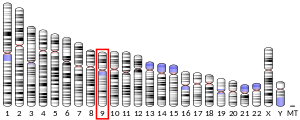ANAPC2
Anaphase-promoting complex subunit 2 is an enzyme that in humans is encoded by the ANAPC2 gene.[5][6]
A large protein complex, termed the anaphase-promoting complex (APC), or the cyclosome, promotes metaphase-anaphase transition by ubiquitinating its specific substrates such as mitotic cyclins and anaphase inhibitor, which are subsequently degraded by the 26S proteasome. Biochemical studies have shown that the vertebrate APC contains eight subunits. The composition of the APC is highly conserved in organisms from yeast to humans. The product of this gene is a component of the complex and shares sequence similarity with a recently identified family of proteins called cullins, which may also be involved in ubiquitin-mediated degradation.[6]
Interactions
ANAPC2 has been shown to interact with ANAPC1[7][8] and ANAPC11.[5][9]
References
- ^ a b c GRCh38: Ensembl release 89: ENSG00000176248 – Ensembl, May 2017
- ^ a b c GRCm38: Ensembl release 89: ENSMUSG00000026965 – Ensembl, May 2017
- ^ "Human PubMed Reference:". National Center for Biotechnology Information, U.S. National Library of Medicine.
- ^ "Mouse PubMed Reference:". National Center for Biotechnology Information, U.S. National Library of Medicine.
- ^ a b Tang Z, Li B, Bharadwaj R, Zhu H, Ozkan E, Hakala K, Deisenhofer J, Yu H (December 2001). "APC2 Cullin protein and APC11 RING protein comprise the minimal ubiquitin ligase module of the anaphase-promoting complex". Mol Biol Cell. 12 (12): 3839–51. doi:10.1091/mbc.12.12.3839. PMC 60759. PMID 11739784.
- ^ a b "Entrez Gene: ANAPC2 anaphase promoting complex subunit 2".
- ^ Vodermaier, Hartmut C; Gieffers, Christian; Maurer-Stroh, Sebastian; Eisenhaber, Frank; Peters, Jan-Michael (September 2003). "TPR subunits of the anaphase-promoting complex mediate binding to the activator protein CDH1". Curr. Biol. 13 (17): 1459–68. doi:10.1016/S0960-9822(03)00581-5. ISSN 0960-9822. PMID 12956947.
- ^ Sumara, I; Vorlaufer E; Gieffers C; Peters B H; Peters J M (November 2000). "Characterization of vertebrate cohesin complexes and their regulation in prophase". J. Cell Biol. 151 (4): 749–62. doi:10.1083/jcb.151.4.749. ISSN 0021-9525. PMC 2169443. PMID 11076961.
- ^ Ohta, T; Michel J J; Schottelius A J; Xiong Y (April 1999). "ROC1, a homolog of APC11, represents a family of cullin partners with an associated ubiquitin ligase activity". Mol. Cell. 3 (4): 535–41. doi:10.1016/S1097-2765(00)80482-7. ISSN 1097-2765. PMID 10230407.
External links
- Human ANAPC2 genome location and ANAPC2 gene details page in the UCSC Genome Browser.
- Human APC2 genome location and APC2 gene details page in the UCSC Genome Browser.
Further reading
- Yu H, Peters JM, King RW, et al. (1998). "Identification of a cullin homology region in a subunit of the anaphase-promoting complex". Science. 279 (5354): 1219–22. Bibcode:1998Sci...279.1219Y. doi:10.1126/science.279.5354.1219. PMID 9469815.
- Grossberger R, Gieffers C, Zachariae W, et al. (1999). "Characterization of the DOC1/APC10 subunit of the yeast and the human anaphase-promoting complex". J. Biol. Chem. 274 (20): 14500–7. doi:10.1074/jbc.274.20.14500. PMID 10318877.
- Gieffers C, Peters BH, Kramer ER, et al. (1999). "Expression of the CDH1-associated form of the anaphase-promoting complex in postmitotic neurons". Proc. Natl. Acad. Sci. U.S.A. 96 (20): 11317–22. Bibcode:1999PNAS...9611317G. doi:10.1073/pnas.96.20.11317. PMC 18031. PMID 10500174.
- Nagase T, Kikuno R, Ishikawa KI, et al. (2000). "Prediction of the coding sequences of unidentified human genes. XVI. The complete sequences of 150 new cDNA clones from brain which code for large proteins in vitro". DNA Res. 7 (1): 65–73. doi:10.1093/dnares/7.1.65. PMID 10718198.
- Gmachl M, Gieffers C, Podtelejnikov AV, et al. (2000). "The RING-H2 finger protein APC11 and the E2 enzyme UBC4 are sufficient to ubiquitinate substrates of the anaphase-promoting complex". Proc. Natl. Acad. Sci. U.S.A. 97 (16): 8973–8. Bibcode:2000PNAS...97.8973G. doi:10.1073/pnas.97.16.8973. PMC 16806. PMID 10922056.
- Jarrett CR, Blancato J, Cao T, et al. (2001). "Human APC2 localization and allelic imbalance". Cancer Res. 61 (21): 7978–84. PMID 11691822.
- Strausberg RL, Feingold EA, Grouse LH, et al. (2003). "Generation and initial analysis of more than 15,000 full-length human and mouse cDNA sequences". Proc. Natl. Acad. Sci. U.S.A. 99 (26): 16899–903. Bibcode:2002PNAS...9916899M. doi:10.1073/pnas.242603899. PMC 139241. PMID 12477932.
- Vodermaier HC, Gieffers C, Maurer-Stroh S, et al. (2004). "TPR subunits of the anaphase-promoting complex mediate binding to the activator protein CDH1". Curr. Biol. 13 (17): 1459–68. doi:10.1016/S0960-9822(03)00581-5. PMID 12956947.
- Capron A, Serralbo O, Fülöp K, et al. (2004). "The Arabidopsis anaphase-promoting complex or cyclosome: molecular and genetic characterization of the APC2 subunit". Plant Cell. 15 (10): 2370–82. doi:10.1105/tpc.013847. PMC 197302. PMID 14508008.
- Kraft C, Herzog F, Gieffers C, et al. (2004). "Mitotic regulation of the human anaphase-promoting complex by phosphorylation". EMBO J. 22 (24): 6598–609. doi:10.1093/emboj/cdg627. PMC 291822. PMID 14657031.
- Humphray SJ, Oliver K, Hunt AR, et al. (2004). "DNA sequence and analysis of human chromosome 9". Nature. 429 (6990): 369–74. Bibcode:2004Natur.429..369H. doi:10.1038/nature02465. PMC 2734081. PMID 15164053.
- Colland F, Jacq X, Trouplin V, et al. (2004). "Functional proteomics mapping of a human signaling pathway". Genome Res. 14 (7): 1324–32. doi:10.1101/gr.2334104. PMC 442148. PMID 15231748.
- Gerhard DS, Wagner L, Feingold EA, et al. (2004). "The status, quality, and expansion of the NIH full-length cDNA project: the Mammalian Gene Collection (MGC)". Genome Res. 14 (10B): 2121–7. doi:10.1101/gr.2596504. PMC 528928. PMID 15489334.
- Rual JF, Venkatesan K, Hao T, et al. (2005). "Towards a proteome-scale map of the human protein-protein interaction network". Nature. 437 (7062): 1173–8. Bibcode:2005Natur.437.1173R. doi:10.1038/nature04209. PMID 16189514.
- Dube P, Herzog F, Gieffers C, et al. (2006). "Localization of the coactivator Cdh1 and the cullin subunit Apc2 in a cryo-electron microscopy model of vertebrate APC/C". Mol. Cell. 20 (6): 867–79. doi:10.1016/j.molcel.2005.11.008. PMID 16364912.
- Beausoleil SA, Villén J, Gerber SA, et al. (2006). "A probability-based approach for high-throughput protein phosphorylation analysis and site localization". Nat. Biotechnol. 24 (10): 1285–92. doi:10.1038/nbt1240. PMID 16964243.





